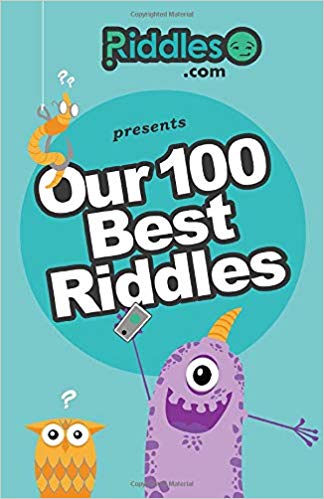Enter a keyword into the search box. The riddle search will check to see if the word is in the Title, Riddle, or Answer and return results if they exist.
"The" Riddles - Next 10 of 3275.
Riddle:
Three pirates, One Eye, Long John, and Peg Leg, were gambling with pieces of gold. All the winnings were piled up on the table. One Eye said, 'I have won 1/2' and took a large handful or two. Long John said, 'I have won 1/3' and took a handful. Peg Leg said, ' I have won 1/6' and took a small handful. One Eye said, ' I have taken too much' and returned a half. Long John said, 'I have taken too much' and returned a third. Peg Leg said, 'I have taken too much and returned a sixth. The money on the table was then shared out equally and they had 42 pieces each. One Eye said, 'I have now 1/2 of the total originally.' Long John said, ' I now have 1/3 of the originally.' Peg Leg said, 'I have now 1/6 of the originally.'
How much was on the table originally?
Answer: 282 Pieces.
Riddle:
In yon vast field of cultivated space, I there am found with members of my race; Decapitate me - if you've no objection - You then will find what brings me to perfection; Take one more cut, and then you'll plainly see What Iam destined, day by day, to be. What am I?
Answer: WHEAT HEAT EAT
Riddle:
I have ten or more daughters. I have less than ten daughters. I have at least one daughter. If only one of these statements is true, how many daughters do I have?
Answer: If I have any daughters, there will always be two statements which are true. Therefore, I have no daughters.
Riddle:
My first is a creature whose breeding is unclear. My second, a price you must pay. My whole can be found in the river of Time and refers to events of today. What am I?
Answer: Current.
Riddle:
Many-manned scud-thumper, Maker of worn wood, Shrub-ruster, Sky-mocker, Rave! Portly pusher, Wind-slave.
What am I?
Answer: The ocean!
Riddle:
An alarm clock runs 4 minutes slow every hour. It was set right 3 1/2 hours ago. Now another clock which is correct shows noon.
In how many minutes, to the nearest minutes, to the nearest minute, will the alarm clock show noon?
Answer: In 3 1/2 hours the alarm clock has become 14 minutes slow. At noon the alarm clock will fall behind approximently an additional minute. Its hands will show noon in 15 minutes.
Riddle:
A student zips on his scooter to ride to the train station to get to college. His home is close to two stops; the first one is a mile from home, and the second is two miles from home in the opposite direction. In the morning, he always gets on at the first stop and in the afternoon, he always gets off at the second one.
Why?
Answer: The sations and his home are on a hill, which allows him to ride down easily on his scooter.
Riddle:
One sunny afternoon, three men go for a ride on a hot air balloon over the Sahara desert. An hour into the trip, the balloon begins to lose altitude. A month later, someone found one of the ballooners laying on the desert sand dead, naked, and holding half a toothpick. What happened to him?
Answer: As the balloon lost altitude, the men took of their clothes and threw them overboard to decrease the weight of the balloon. The balloon continued to drop so the men drew straws to see who would be forced to jump. The dead man in the desert drew the shortest one (the half toothpick).
Riddle:
Where is there no south, west, nor east, and weather is not fit for man or beast?
Answer: The South Pole.
Riddle:
A watchmaker was telephoned urgently to make a house call to replace the broken hands on a clock. He was sik so he sent his apprentice.
The apprentice was thorough. When he finished inspecting the clock it was dark. Assuming his work was done, he attached the new hands and set the clock by his pocket watch. It was sic o'clock, so he set the big hand at the 12 and the little hand at the 6.
The apprectice returned, but soon the telephone rang. He picked up to his angry client:
"You didn't do the job right. The clock shows the wrong time."
Surprised he hurried back. He found the clock showing not much past eight. He handed is watch to the client and showed her that her clock was not even one second late. The client had to agree.
Early the nect morning, the client telephoned to say the clock has apparently gone berserk, hands were moving around the clock at will. The apprentice again rushed over, the clock showed a little past seven. After checking his watch he yelled:
"You are making fun of me! Your clock shows the right time!"
Have you figured out whats going on?
Answer: As the problem says the apprentice mixed up the hands so that the minute hand was short and the hour hand was long.
The first time the apprentice returned to the client was about 2 hours and 10 minutes after he had set the clock at six.The long had moved olny from twelve to a little past two. The little made two whole circles and an additional 10 minutes. Thus the clock showed the correct time.
The next day around 7:o5 a.m.he came a second time,13 hours and 15 minutes after he had set the clock for six. The long had, acting as the hour hand,covered 13 hours to reach 1. The short hand made 13 full circles and 5 minutes, reaching 7, So the clock showed the correct time again.

